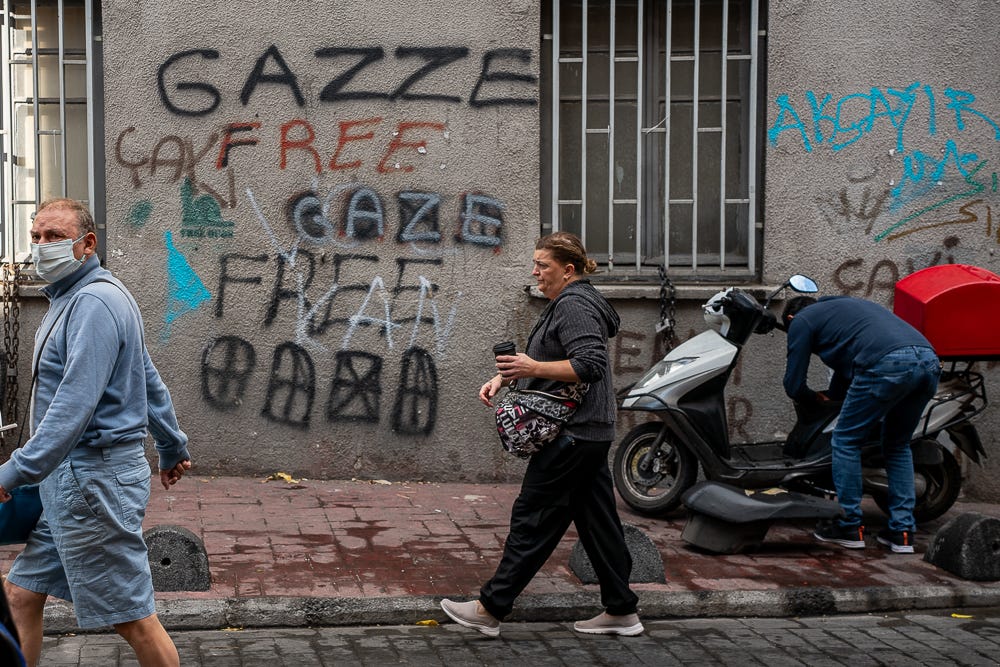There’s nothing funny about the terrible events in Israel and Palestine this week, and yet somehow the CHP still managed to make a joke. Of itself.
In today’s edition:
Turkey reacts to the Israel-Hamas war
Syria ops continue after US downs Turkish drone
CHP inner-party fighting gets worse
Can Atalay’s lawyer remains “hopeful”
Leaked document shows investors’ concerns
Turkey’s latest statue of limitations
Also, we’re excited to welcome our new editorial intern, Semanur Beşevli!
And don’t miss Matt Hanson’s report on Turkish biologists’ efforts to protect Black Sea marine life despite the Russia-Ukraine war and its ecological toll on the region.
After years of strains, Turkey and Israel seemed to be on their way to normalizing relations.
Last year, ambassadors were exchanged. Last month, Turkish Pres. Recep Tayyip Erdoğan met Israeli PM Benjamin Netanyahu for the first time ever. And next month Turkey’s energy minister was set to visit Israel to discuss natural gas shipments through Turkey to EU markets.
Then Hamas attacked Israel Saturday, Gaza’s been getting bombed ever since and a ground offensive appears imminent at the time of writing. The Palestinian cause has wide appeal across Turkey’s society, but especially for Erdoğan, the AKP and his supporters, one of whom this week repeated word by word to me this part of the president’s speech from Tuesday:
“Water is not being supplied to Gaza right now. What about human rights? There is no electricity, it is not provided. What about human rights?”
Other political party reactions were equally supportive. Leading CHP figures made calls for solidarity with Palestine. So did YSP and TİP. Former PM and Gelecek head Ahmet Davutoğlu took it a step further, backing what he called a “justified resistance.”
In contrast, İYİ chair Meral Akşener was one of few figures to define the Hamas attacks as a terrorist activity (along with Israel’s response). And from the AKP crowd, former Deputy PM Bülent Arınç stood out by criticizing Hamas, saying: “They don't listen.”
But most ruling party members were fully behind Palestine, which partly explains Ankara’s repeated calls to de-escalate and offers to mediate. The other part is to “demonstrate Turkey’s importance within the Muslim world and its value to Western allies,” as analyst Howard Eissenstat explains here.
Erdoğan’s more recent and more assertive statements, though, reflect the slim chances of a mediation role for Turkey, according to Gallia Lindenstrauss, a senior research fellow at the Tel Aviv-based Institute for National Security Studies and specializes in Turkish foreign policy.
“Turkey has for a long time emphasized that it has a moderating role on Hamas,” Lindenstrauss told Turkey recap.
She continued, “While the presence of Hamas operatives on Turkish soil has been a bone of contention between the two states for many years, after what happened on October 7th Israel has basically adopted the narrative that Hamas equals Daesh and, hence, there is no longer room for moderation attempts upon Hamas.”
“Israel also is not looking at all currently for mediation with Hamas, except for the issue of the quick release of the elderly, mothers and the young children held hostages in Gaza. Also, Israel is likely to prefer Cairo over Ankara to be the mediator.”
Still, Reuters reported Wednesday that Turkish officials overseeing negotiations to secure the release of some hostages.
The situation remains fluid and unpredictable, but the long-term question for Erdoğan is whether he can continue on the pragmatic course, one of warming ties with Israel and realpolitik, or whether his party, voter base and conscience will require a harder stance on a core ideological issue.
– Diego Cupolo
Keep reading with a 7-day free trial
Subscribe to Turkey recap to keep reading this post and get 7 days of free access to the full post archives.




